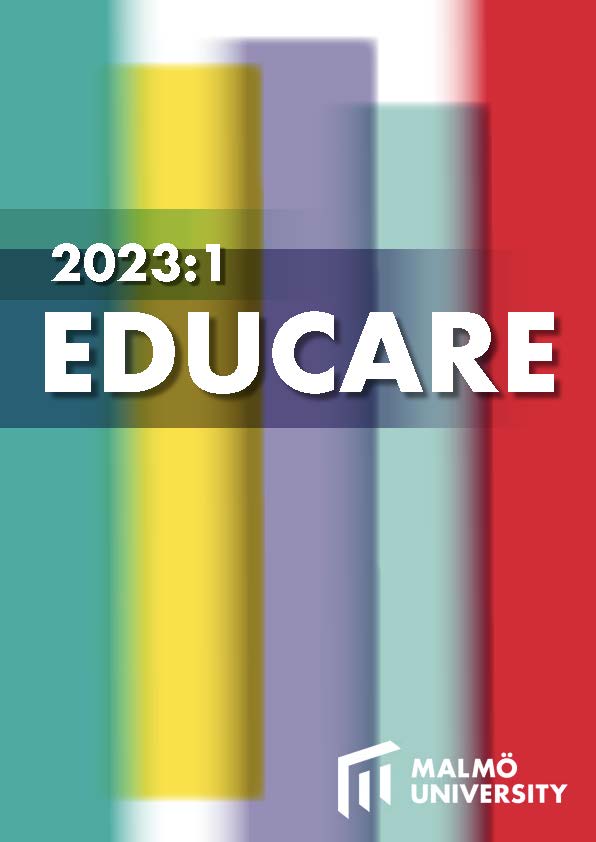Analysing Interaction in Science Classrooms
A Comparative Study of two Discourse Analysis Frameworks
DOI:
https://doi.org/10.24834/educare.2023.1.752Keywords:
Classroom discourse, Communicative approach, Science education, Speech functions, Systemic functional linguisticsAbstract
One central issue for research in classrooms is to provide insights concerning characteristics of classroom interaction that can help teachers improve their teaching. In the present study, we analyse spoken interaction in one elementary physics classroom by the use of two different frameworks, targeting similar aspects of social communication, namely how discourse patterns shape the relations between participants. The two frameworks utilized are on the one hand analyses of the communicative approach according to Mortimer and Scott, combined with analyses of discourse patterns such as IRE-patterns, and on the other hand analyses related to the interpersonal meta-function in Halliday’s systemic-functional grammar, SFG. The aim was to highlight possibilities and limitations of the different frameworks.
Our analyses reveal that the two analytical frameworks have partly the same, partly different affordances concerning what they can reveal about classroom interaction. The analyses of the communicative approaches have the potential of elucidating discursive patterns and power relations at a general level, while the analyses based on SFG can provide more details about the power relations in terms of how the participants actually structure their utterances. The results are also discussed regarding implications for education.
References
Bakhtin, M.M. (1986). Speech Genres and Other Late Essays, edited by C. Emerson and M. Holquist (translation: V.W. McGee). Texas University Press.
Bossér, U., & Lindahl, M. (2019). Students’ positioning in the classroom: a study of teacher-student interactions in a socioscientific issue context. Research in Science Education, 49(2), pp. 371–390. Doi: 10.1007/s11165-017-9627-1
Bybee, R. W. (2006). Scientific inquiry and science teaching. In L.B. Flick & L.D. Ledermann (Eds), Scientific Inquiry and Nature of Science. Implications for Teaching, Learning, and Teacher Education, pp. 1–14. Springer.
Buty, C., & Mortimer, E.F. (2008). Dialogic/authoritative discourse and modelling in a high school teaching sequence on optics. International Journal of Science Education, 30(12), pp. 1635–1660. Doi: 10.1080/09500690701466280
Cavalcanti Neto, A.L., Ribeiro do Amaral, E.M., & Mortimer, E.F. (2018). Analyzing discursive interactions in science classrooms to characterize teaching strategies adopted by teachers in lessons on environmental themes. In K.-S. Tang & K. Danielsson (Eds), Global Developments in Literacy Research for Science Education, pp. 149–166. Springer.
Chin, C. (2006). Classroom interaction in science: Teacher questioning and feedback to students’ responses. International Journal of Science Education, 28(11), pp. 1315–1346. Doi: 10.1080/09500690600621100
Halliday, M.A.K. (1978). Language as Social Semiotic. The Social Interpretation of Language and Meaning. Edward Arnold.
Halliday, M.A.K., & Matthiessen, C. (2014). Halliday’s Introduction to Functional Grammar (4th ed.). Routledge.
Kearney, M. (2004). Classroom use of multimedia-supported Predict–Observe–Explain tasks in a social constructivist learning environment. Research in Science Education, 34, pp. 427–453. Doi: 10.1007/s11165-004-8795-y
Kelly, G. J. (2007). Discourse in science classrooms. In S. K. Abell and N. G. Lederman (Eds), Handbook of Research on Science Education, pp. 443–469. Lawrence Erlbaum Associates.
Kim, S., & Hand, B. (2015). An analysis of argumentation discourse patterns in elementary teachers’ science classroom discussions. Journal of Science Teacher Education, 26(3), pp. 221–236. Doi:10.1007/s10972-014-9416-x
Koole, T. (2010). Displays of epistemic access: Student responses to teacher explanations. Research on Language and Social Interaction, 43(2), pp. 183-209. Doi: 10.1080/08351811003737846
Knain, E. (2015). Scientific Literacy for Participation: a Systemic Functional Approach to Analysis of School Science Discourses: Sense Publishers.
Lee, Y-A. (2007). Third-turn position in teacher talk: Contingency and the work of teaching. Journal of Pragmatics, 39(6), pp. 180–206. Doi: 10.1016/j.pragma.2006.02.004
Lemke, J. L. (1990). Talking Science: Language, Learning and Values: Ablex.
Llinares, A., Morton, T., & Whittaker, R. (2012). The Roles of Language in CLIL. Cambridge University Press.
Martin, J.R., & Rose, D. (2007). Working with Discourse: Meaning Beyond the Clause (2nd ed.). Continuum.
Martin, J.R., & White, P.R.R. (2005). The Language of Evaluation. Appraisal in English. Palgrave McMillan.
Mehan, H. (1979). Learning Lessons: Social Organization in the Classroom. Harvard University Press.
Mortimer, E., & Scott, P. (2003). Meaning Making in Secondary Science Classrooms. A Communicative Approach. Open University Press.
Nygård Larsson, P. (2018). “We’re talking about mobility:” Discourse strategies for promoting disciplinary knowledge and language in educational contexts. Linguistics and Education, 48, pp. 41–65. Doi: 10.1016/j.linged.2018.10.001
Rose, D. (2018). Pedagogic register analysis: Mapping choices in teaching and learning. Functional Linguistics, 5(3), pp. 1–33. Doi: 10.1186/s40554-018-0053-0
Scott, P.H., Mortimer, E. F., & Aguiar, O.G. (2006). The tension between authoritative and dialogic discourse: A fundamental characteristic of meaning making interactions in high school science lessons. Science Education 90(4), pp. 605–631. Doi: 10.1002/sce.20131
Sinclair, J., & Coulthard. M. (1975). Towards an Analysis of Discourse. Oxford University Press.
Tan, A. L., & Tang, K. S. (2019). The role of dialogue in science epistemic practices. In N. Mercer, R. Wegerif, & L. Major (Eds.), The Routledge International Handbook of Research on Dialogic Education, pp. 546–557. Routledge.
Thompson, G. (2014). Introducing Functional Grammar. 3rd Ed. Routledge.
Thwaite, A., Jones, P., & Simpson. A. (2020). Enacting dialogic pedagogy in primary literacy classrooms: Insights from systemic functional linguistics. The Australian Journal of Language and Literacy 43(1), pp. 33–46. Doi: 10.3316/informit.949635084525088
Tytler, R., & Aranda, G. (2015). Expert teachers’ discursive moves in science classroom interactive talk. International Journal of Science and Mathematics Education, 13(2), pp. 425–446. Doi: 10.1007/s10763-015-9617-6
White, R., & Gunstone, R. (1992). Probing Understanding. The Falmer Press.
Downloads
Published
How to Cite
Issue
Section
License
Copyright (c) 2023 Kristina Danielsson, Ewa Bergh Nestlog, Fredrik Jeppsson, Kok-Sing Tang

This work is licensed under a Creative Commons Attribution-NonCommercial 4.0 International License.



